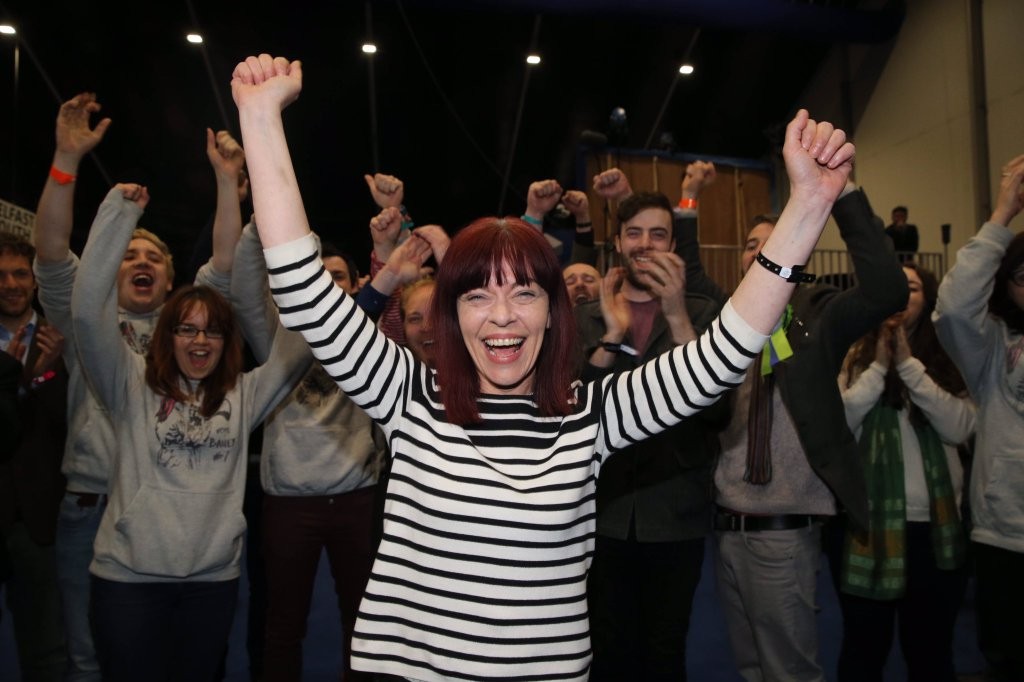Winds of change in Northern Ireland as Greens and People Before Profit win seats

It’s a good day to be a leftie in Northern Ireland. Green Party leader Steven Agnew retained his seat in North Down and Deputy Leader Clare Bailey gained a seat in South Belfast, with the Greens also enjoying an overall vote share increase of 1.8%, making the Greens not only the one party already in the Assembly to increase their vote this election, but also the party to secure a higher vote share increase than any other. Clare managed to jump from no seat to fifth, and Steven went from just scraping into the sixth seat in 2011 to safely securing the 3rd this time round, nearly doubling his first place preferences too.
The Greens will have some friends in Stormont too–both West Belfast and Foyle elected People Before Profit MLA’s (Gerry Caroll and Eamonn McCann), individuals with a proven track-record of activism on civil rights and furthering socialist ideals, hailing from a party that shares Green desires for more democracy, equality and sustainability. PBP victories have also been Sinn Fein losses, eating away at traditionally nationalist heartlands and sowing the potential for a different kind of politics to emerge in Northern Ireland.
Yet this election has also brought with it challenges for the months and years ahead. Just as Green success in Scotland has come with an emboldened Conservative Party, so too in NI the success of the Greens and People Before Profit is tempered by the immovability of the DUP. This means there are still the largest party in the Assembly at a time when Sinn Fein are losing ground, keeps them the office of the First Minister and allows them to continue to abuse the petition of concern, a legislative device that they have used to block same-sex marriage no fewer than 5 times now.
However, with all 5 of the major parties in NI losing considerable chunks of their previous vote shares, it will be interesting to see how long it will be before more seats begin to change hands and smaller parties can make up ground. Disillusionment with the Big Five is matched by overall poor turnout—a mere 54.2% turned out to cast their ballot on Thursday, a figure close to the lowest recorded UK-wide a figure that triggered considerable political and academic concern—there is opportunity here, as evidenced by Stormont’s latest recruits, for smaller parties to capitalise on this distaste for politics as usual.
The next five years are going to be fought on multiple fronts—Northern Ireland needs to catch up with the rest of the UK’s civil rights—much has been written about its regressive abortion laws and LGBT rights, issues the Greens have been on the frontline of challenging, but there are other areas where radical reform is needed too. Stormont is yet to adopt a Climate Change Act, it currently fails to provide legal protections for Students’ Unions and it has the worst performing economy of the 4 nations of the UK and the Greens have ambitious, progressive and achievable policy in all these areas. They now an increased platform from which to launch the fight, as well as new allies in the Assembly to help them see it through. Above all they need to demonstrate a new kind of politics, one that engages and inspires people, something all of the UK but in particular Northern Ireland needs. There’s a wind of change blowing in Northern Ireland—let’s see how strong and how far it can take us.




THE SELF SERVING ,BACK SCRATCHING TWO FACED AND CONTEMPTUOUS ATTITUDE OF THE ESTABLISHMENT AND THEIR MINIONS HAS GOT TO SUCH A HEAD THAT OUR YOUNG PEOPLE ARE REALIZING IT IS NOW OR NEVER, IF THEY ARE NOT TO BE SHOVED INTO THE SAME BACK ALLEYS OF POWERLESS POVERTY OF THEIR/OUR ANCESTORS. THE POWER OF RIDICULE AND SHAME IS SEEN ALL AROUND THE UK.